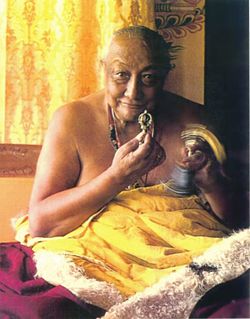A Quote by Lobsang Tenzin
Training and education is one and the same: that is, to train the mind through a discipline in order to awake the inner intelligence of the individuals.
Related Quotes
If there be an order in which the human race has mastered its various kinds of knowledge, there will arise in every child an aptitude to acquire these kinds of knowledge in the same order. So that even were the order intrinsically indifferent, it would facilitate education to lead the individual mind through the steps traversed by the general mind. But the order is not intrinsically indifferent; and hence the fundamental reason why education should be a repetition of civilization in little.
We have to think and see how we can fundamentally change our education system so that we can train people to develop warm-heartedness early on in order to create a healthier society. I don't mean we need to change the whole system, just improve it. We need to encourage an understanding that inner peace comes from relying on human values like, love, compassion, tolerance and honesty, and that peace in the world relies on individuals finding inner peace.
[The] erroneous assumption is to the effect that the aim of public education is to fill the young of the species with knowledge and awaken their intelligence, and so make them fit to discharge the duties of citizenship in an enlightened and independent manner. Nothing could be further from the truth. The aim of public education is not to spread enlightenment at all; it is simply to reduce as many individuals as possible to the same safe level, to breed and train a standardised citizenry, to put down dissent and originality.
Happiness is not the endless pursuit of pleasant experiences - that sounds more like a recipe for exhaustion - but a way of being that results from cultivating a benevolent mind, emotional balance, inner freedom, inner peace, and wisdom. Each of these qualities is a skill that can be enhanced through training the mind.
The mind is a mechanism. It has no intelligence. The mind is a bio-computer. How can it have any intelligence? It has skill, but it has no intelligence; it has a functional utility, but it has no awareness. It is a robot; it works well but don`t listen to it too much because then you will lose your inner intelligence. Then it is as if you are asking a machine to guide you, lead you. You are asking a machine which has nothing original in it.
In order to find out how to reveal our innermost Being, the sages explored the various sheaths of existence, starting from body and progressing through mind and intelligence, and ultimately to the soul. The yogic journey guides us from our periphery, the body, to the center ofour being, the soul. The aim is to integrate the variouslayers so that the inner divinity shines out as through clear glass.
Zen purposes to discipline the mind itself, to make it its own master, through an insight into its proper nature. This getting into the real nature of one's own mind or soul is the fundamental object of Zen Buddhism. Zen, therefore, is more than meditation and Dhyana in its ordinary sense. The discipline of Zen consists in opening the mental eye in order to look into the very reason of existence.
Just as the education of nerve and sinew is vital to the excellent athlete and education of the mind is vital to the scholar, education of the conscience is vital to the truly proactive, highly effective person. Training and educating the conscience, however, requires even greater concentration, more balanced discipline, more consistently honest living. It requires regular feasting on inspiring literature, thinking noble thoughts and, above all, living in harmony with its still small voice.






































